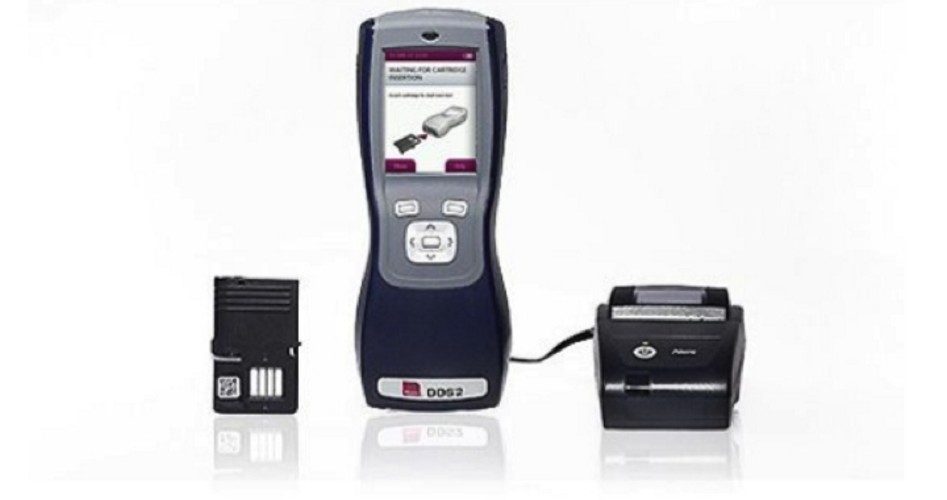
The California state assembly is considering a bill that would permit on-the-spot drug testing using “drug breathalyzers.” Assembly Bill 1356 was introduced by Assemblyman Tom Lackey, who cites the increasing use of marijuana as a cause for concern.
The drug tests are capable of detecting amphetamines and cocaine as well.
The bill states, “Existing law provides that a person who drives a motor vehicle is deemed to have given his or her consent to chemical testing of his or her blood for the purpose of determining the drug content of his or her blood, if lawfully arrested for driving under the influence of alcohol or drugs.”
“This bill would provide that a person who drives a motor vehicle is deemed to have given his or her consent to chemical testing of his or her blood or oral fluids for the purpose of determining the drug content of his or her blood or oral fluids.”
If passed, police officers would be able to collect fluid samples from people suspected of driving impaired using a swab and have the results within minutes.
Using a portable drug detection tool called Alere DDS®2 (shown), police officers could perform oral fluids test of the driver’s gum line and cheeks. The device can detect marijuana within two to three hours of use, reports CBS San Francisco. The tip of the tool is then put into a portable machine for immediate testing rather than requiring a blood test.
RT reports, “Such blood tests have previously been necessary to verify an arrest made on the suspicion of drugged driving.”
Just how much drug found in a person’s system will warrant jail time is unclear at the moment.
According to the product’s webpage, it was developed to “meet the high performance demands of law enforcement agencies, drug treatment centres and workplace environments.”
The Los Angeles Police Department has been testing the devices since 2013. The city was given a federal grant to try the new roadside drug test. City attorney Mike Feuer called the technology “the wave of the future.”
But some fear the slippery slope that such authority creates. Medical marijuana dispensary owner Lanette Davies says she’s concerned that the new technology could be a potential tool for police abuse of those who use marijuana medicinally. “An impaired driver I would completely support not driving,” she asserted. “However, this is just another way of having zero tolerance for people with THC in their system.”
Many advocates in favor of marijuana legalization feel strongly that people should not drive while impaired. But some are concerned that new technology such as this one would allow police officers to use too much discretion. “I think that people want to have a clear-cut, black-and-white solution,” says Mason Tvert, the communications director for the Marijuana Policy Project, a pro-legalization group. “They want a specific number that we can use to just say that this person is impaired or not. Unfortunately, it’s a little more of a gray area than that.”
According to Tvert, having a number attached to “impairment” could result in people who are perfectly sober being arrested and charged. Tvert fears that the use of this technology could lead to “excessive and overzealous reporting” on the subject.
That is not to say that marijuana legalization advocates believe that drivers should be allowed to be under the influence of marijuana. “We allow adults to use alcohol responsibly, and we punish adults if they use it irresponsibly, and that includes driving while drunk,” he says. “We should be doing the same thing with marijuana.”
A government study on impaired driving released in February found that drivers who had used marijuana were at a far lower risk of getting into a car accident than drivers who had used alcohol.
The Huffington Post reports:
The Drug and Alcohol Crash Risk report, produced by the Department of Transportation’s National Highway Traffic Safety Administration, found that while drunken driving dramatically increased the risk of getting into an accident, there was no evidence that using marijuana heightened that risk. In fact, after adjusting for age, gender, race and alcohol use, the report found that stoned drivers were no more likely to crash than drivers who were not intoxicated at all.
According to the researchers, once age, sex, and race/ethnicity were taken into consideration, the risk ratio shrank.
“This analysis shows that the significant increased risk of crash involvement associated with THC and illegal drugs … is not found after adjusting for these demographic variables,” the report reads. “This finding suggests that these demographic variables may have co-varied with drug use and accounted for most of the increased crash risk. For example, if the THC-positive drivers were predominantly young males, their apparent crash risk may have been related to age and gender rather than use of THC.”
However, the federal researchers say that their report’s findings “do not indicate that drug use by drivers is risk-free,” adding that “the study limitations … together with the findings of numerous other studies using different and complementary methods, need to be carefully considered before more definitive conclusions about drug use and crash risk can be reached.”
Still, Assemblyman Lackey asserts that drug breathalyzers will help to save lives. “It’s very, very disheartening when you go into the home of someone to share with them the absolute worst news possible, that their loved one has been stolen because of this decision making,” he said. “And so when you experience that it changes you, it changes your perspective.”
Lackey does not have information on how much the use of this technology would cost taxpayers, or what department would be expected to fund it. The Sacramento Bee reports that the devices currently cost approximately $5,000 per unit.
Police in California believe the drug testing tool is a necessity if the state has future plans to legalize marijuana. “The number of drugged drivers is increasing rapidly, and those of us in law enforcement simply do not have the tools necessary to determine the level of impairment on anything other than alcohol,” said Ron Lawrence, chief of police for Rocklin. “If the legalization of marijuana is in our future, we in California law enforcement need to be prepared to deal with the roadways and safety precautions of tomorrow.”




